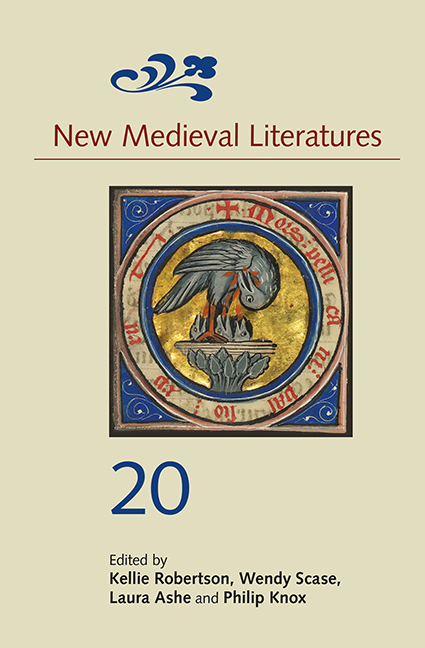Book contents
- Frontmatter
- Contents
- List of Illustrations
- List of Abbreviations
- 1 Lion-Keu-Coupé: A Missing Link in Yvain or Le Chevalier au Lion
- 2 John of Howden’s Rossignos and the Sounds of Francophone Devotion
- 3 ‘Wereyed on every side:’ Chaucer’s Troilus and Criseyde and the Logic of Siege Warfare
- 4 ‘Ave ave ave [ave]:’ The Multilingual Poetics of Exuberance in Bruder Hans
- 5 Performative Typology, Jewish Gender and Jesus’s Queer Romance in the York Corpus Christi Plays
- 6 Locating Charles d’Orléans: In France, in England and Out of Europe
- 7 Urinals and Hunting Traps: Curating Fifteenth-Century Pragmatic Books
5 - Performative Typology, Jewish Gender and Jesus’s Queer Romance in the York Corpus Christi Plays
Published online by Cambridge University Press: 30 April 2020
- Frontmatter
- Contents
- List of Illustrations
- List of Abbreviations
- 1 Lion-Keu-Coupé: A Missing Link in Yvain or Le Chevalier au Lion
- 2 John of Howden’s Rossignos and the Sounds of Francophone Devotion
- 3 ‘Wereyed on every side:’ Chaucer’s Troilus and Criseyde and the Logic of Siege Warfare
- 4 ‘Ave ave ave [ave]:’ The Multilingual Poetics of Exuberance in Bruder Hans
- 5 Performative Typology, Jewish Gender and Jesus’s Queer Romance in the York Corpus Christi Plays
- 6 Locating Charles d’Orléans: In France, in England and Out of Europe
- 7 Urinals and Hunting Traps: Curating Fifteenth-Century Pragmatic Books
Summary
Because the York Corpus Christi Plays depicted a panoramic account of Christian experience from creation to doomsday, they also by necessity depicted the Jewish experience. Within the Christian typological imaginary, events and figures from the Hebrew Bible, redubbed the Old Testament, are conceived as prophetic predictors of Jesus's fulfilment of eternal truths as yet unfulfilled. In positing a radical rupture between the Jewish past of the Old Testament and the Christian present and future of the New Testament, typology insists upon the linearity of time leading inexorably to Christian transcendence, yet Christianity can never supersede its roots in Jewish traditions. Judaism and Christianity stand side-by-side in the pages of the Christian Bible, yet they simultaneously stand at odds, with Jewish texts conscripted to serve as the foundation of a faith separate from its own traditions, and with the New Testament deploying these texts to fortify its pronouncement of new eternal truths. In staging biblical scenes for the edification and entertainment of their audiences, the York Corpus Christi Plays thematize Christianity's inevitable supersession of Judaism yet concomitantly depict the impossibility of a stable typology, owing to the disruptive queerness inherent in portraying biblical genders, sexualities and erotic ideologies. In his classic study The Play Called Corpus Christi, V. A. Kolve describes this cycle as a playful but serious artistic enterprise, one that was conceived as ‘a lie designed to tell the truth about reality’, the aim of which ‘was to celebrate and elucidate, not even temporarily, to deceive’. Playful dramas, however, rarely unfold as straightforwardly as their playwrights might intend.
As is well known, the York Corpus Christi Plays date to the late fourteenth century, with their early foundations and development remaining the subject of much scholarly debate. Their fundamental structure and content were registered in the ‘Ordo paginarum ludi Corporis Christi’, a 1415 document detailing the pageants, their characters and the trade guilds that produced them. Following the Reformation, the celebration of Corpus Christi was abolished in 1548, with the plays last performed in 1569 on ‘Tewisday in witsone weeke’.
- Type
- Chapter
- Information
- New Medieval Literatures 20 , pp. 143 - 173Publisher: Boydell & BrewerPrint publication year: 2020



